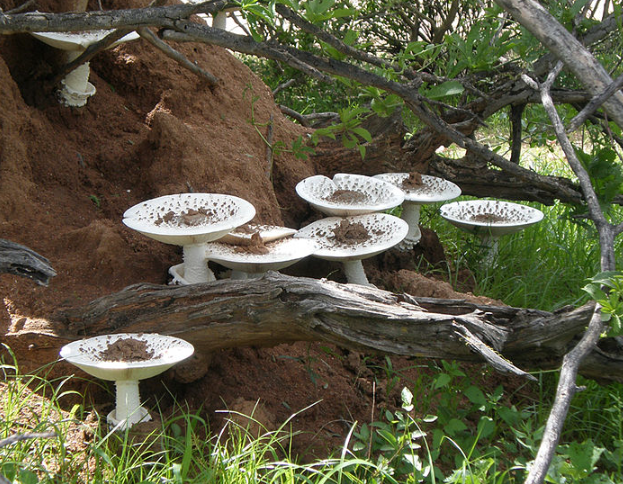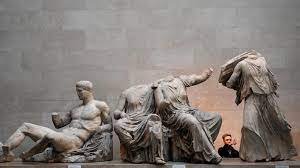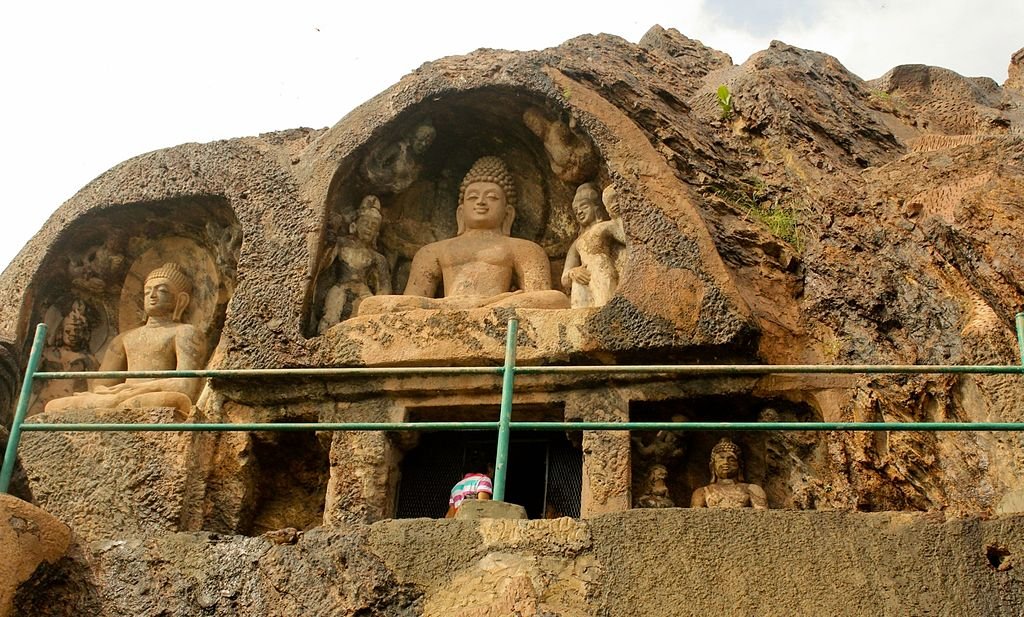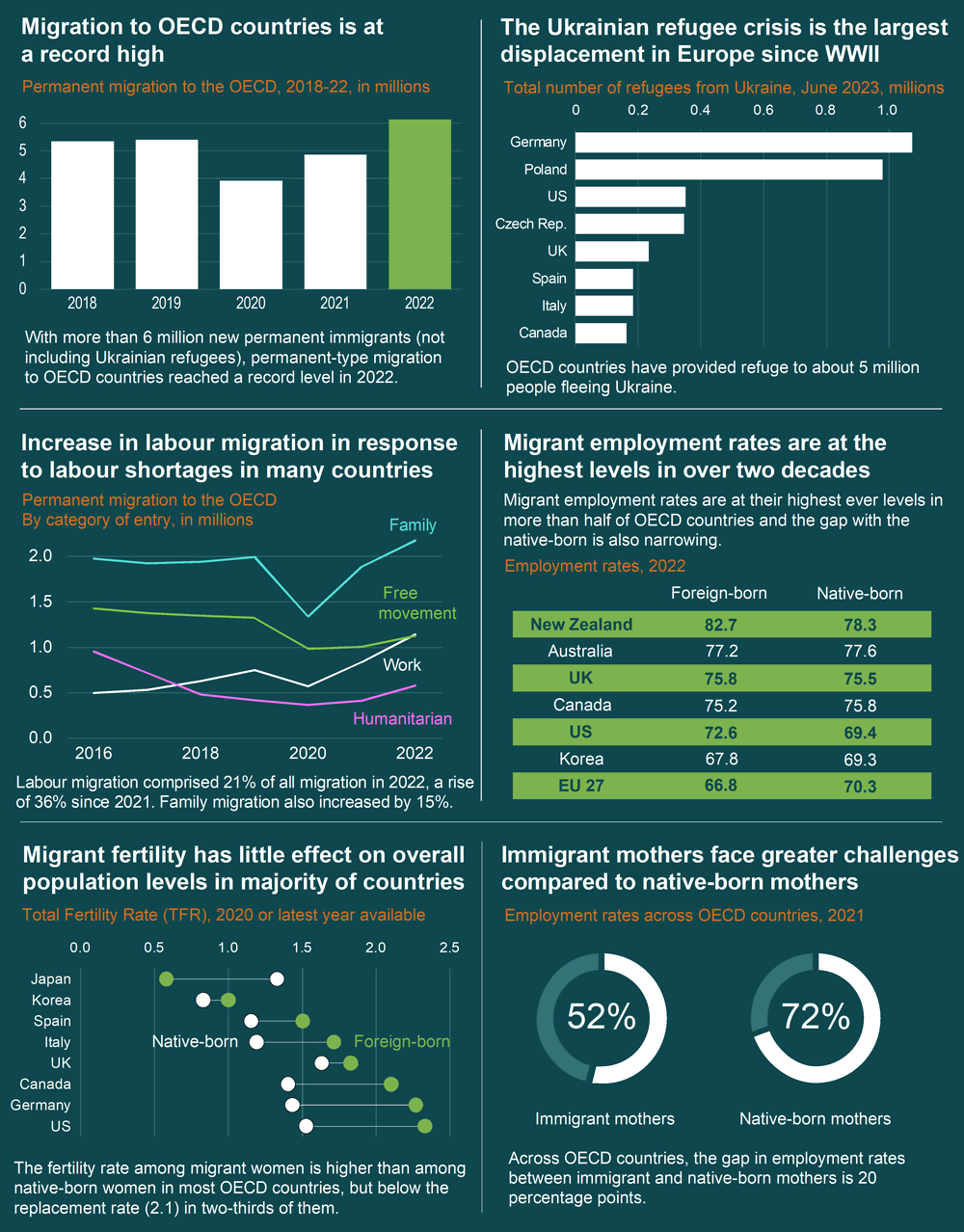
Current Affairs August 13, 2023: Vasudhaiva Kutumbakam, Bhartiya Nyaya Sanhita, 2023, Bharatiya Nagarik Suraksha Sanhita (BNSS), Bharatiya Sakshya Bill, 2023, Election Commission, Adjournment sine die
Subscribers of "Current Affairs" course can Download Daily Current Affairs in PDF/DOC
Subscribe to Never Miss an Important Update! Assured Discounts on New Products!
Must Join PMF IAS Telegram Channel & PMF IAS History Telegram Channel
{Essay – Philosophical – 2023/08/13} Vasudhaiva Kutumbakam
- Context (TH): China opposed using non-UN languages, such as the Sanskrit term Vasudhaiva Kutumbakam in its G-20 logo.
“Vasudhaiva Kutumbakam” or “One Earth, One Family, One Future’
- It is the theme of India’s G20 Presidency.
- It is drawn from the ancient Sanskrit text of the Maha Upanishad.
- It affirms the value of all life — human, animal, plant, and microorganisms — and their interconnectedness on Earth and in the broader universe.
Essay points
- Throughout history, humans fought for limited resources as their survival depended on denying them to others.
- Confrontation and competition became the norm between ideas, ideologies, and identities.
- Even today, countries fight over territory or resources, supplies of essential goods are weaponised, and vaccines are hoarded by a few, even as billions remain vulnerable.
- Some may argue that confrontation and greed are just human nature, but they aren’t. So many spiritual traditions advocate the fundamental oneness of all of us.
- Today, we do not need to fight for survival. Our era need not be one of war.
- The most significant challenges we face — climate change, terrorism, and pandemics — can be solved not by fighting each other but only by acting together.
- Our priorities should focus on healing our “One Earth“, creating harmony within our “One Family“, and giving hope for our “One Future”.
- To heal our planet, we should encourage sustainable and environment-friendly lifestyles based on India’s tradition of trusteeship towards nature.
- To promote harmony within the human family, we shall seek to depoliticise the global supply of food, fertilisers, and medical products, so that geopolitical tensions do not lead to humanitarian crises.
- We shall encourage an honest conversation among the most powerful countries on mitigating risks posed by weapons of mass destruction and enhancing global security.
{GS1 – A&C – Personalties – 2023/08/13} Sant Ravidas

- Guru Ravidas was an Indian mystic poet-saint of the Bhakti movement and founder of the Ravidassia religion during the 15th to 16th century CE.
- Guru Ravidas Jayanti is celebrated yearly on Magh Purnima (full moon day of Magh month).
|
- Guru Ravidas was born in Varanasi into an untouchable leather-working Chamar caste.
- He was a vocal critic of caste discrimination and gender inequality.
- He valued the worship of a formless God, Nirguna sampradaya (sant parampara).
- The Sikh Holy Book, Guru Granth Sahib, compiled by Guru Arjan Dev, the fifth Guru of the Sikhs, contains 41 verses of Guru Ravidass.
- Guru Ravidas envisioned a society called “Begampura”, a city without grief or fear, where everyone is equal, and discrimination is not tolerated.
- He is considered a spiritual Guru of Meera Bai who was the queen of Chittoor.
- Guru Ravidas’s philosophy of life is reflected in India’s constitutional values of social justice, freedom, equality and fraternity.
{GS2 – MHA – Laws – 2023/08/13} Bhartiya Nyaya Sanhita, 2023
- Context (TH I IE): The Lok Sabha referred to the Parliamentary Standing Committee three Bills that are aimed to overhaul the criminal justice system completely:
- Bharatiya Nyaya Sanhita, 2023 (which seeks to replace IPC).
- Bharatiya Nagarik Suraksha Sanhita (which seeks to replace the CrPC).
- Bharatiya Sakshya Bill (which seeks to replace Evidence Act).
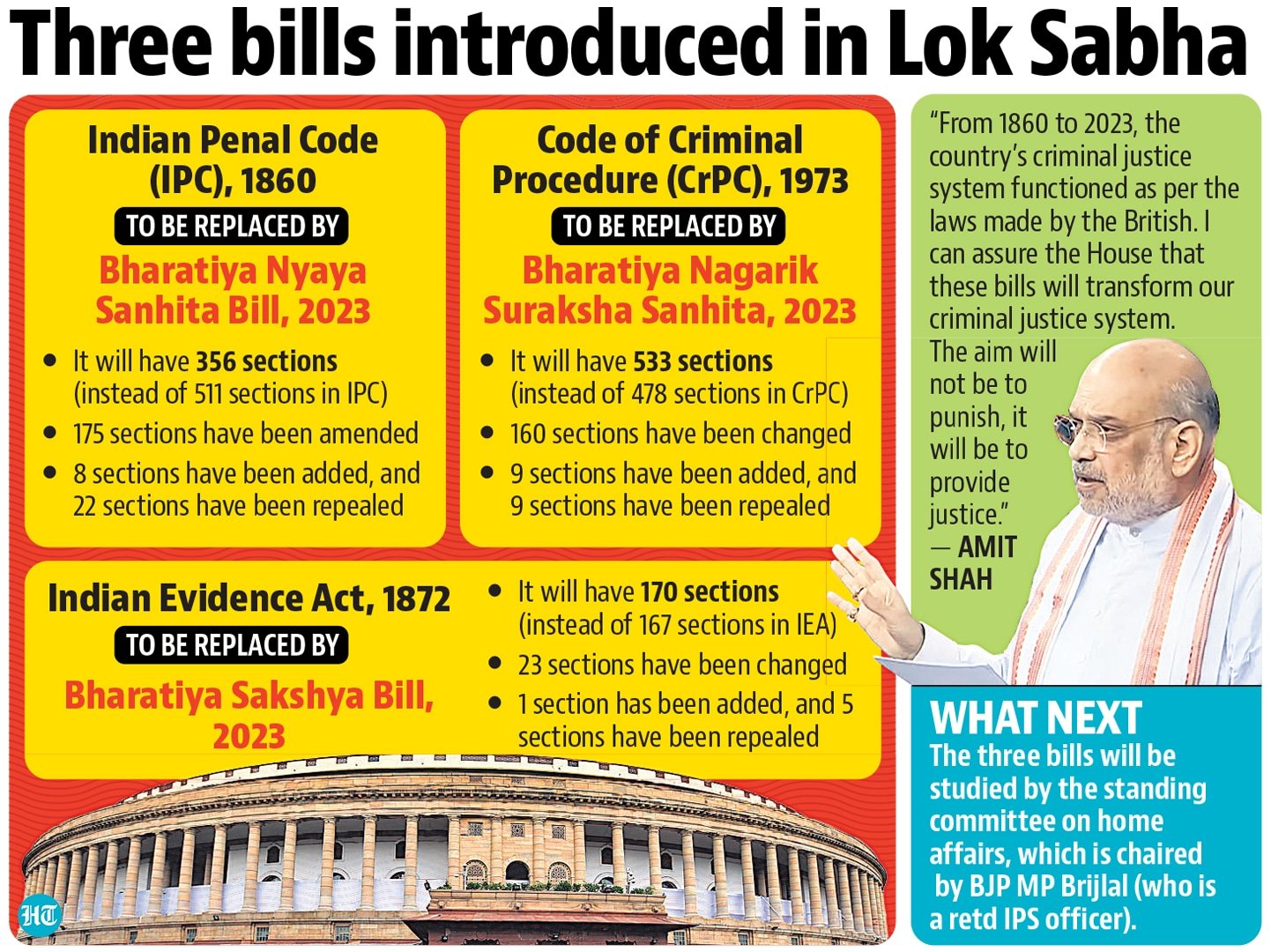
Need for new bills
- The current laws were drafted during colonial times and contain archaic language.
- Some concepts do not accurately reflect current social norms and values.
- The Indian Evidence Act was enacted before the advent of modern forensic tools. Hence it is not effective against the new dimensions to crime, evidence, and investigation.
- The laws have become complex over time, leading to confusion among legal practitioners, law enforcement agencies, and the general public.
- The Parliamentary Standing Committee in its 111th and 128th reports had also highlighted the need for reforms in criminal laws.
Criminal law reforms committee and its criticism
- The Ministry of Home Affairs (MHA) constituted a committee headed by Prof. (Dr.) Ranbir Singh, former Vice Chancellor of National Law University (NLU), Delhi, to review the three criminal law codes.
- The committee submitted its recommendations in 2022 on the criminal law amendments.
- However, the committee came under attack for:
- Its lack of diversity.
- The absence of transparency in its functioning.
- Whether the committee functioned independently of the MHA.
- The absence of relevant stakeholders, with no women, Dalits, religious minorities, adivasis, LGBTQ persons, or persons with disabilities on the committee.
Bharatiya Nyaya Sanhita (BNS) Bill, 2023
- It will repeal and replace the more than 160-year-old IPC.
- The IPC was drafted by the first Law Commission which was chaired by Thomas Babington Macaulay in 1834. The code came into force in 1860.
- BNS repeals 22 provisions of IPC, proposes changes to 175 existing provisions and introduces 9 new Sections. It contains a total of 356 provisions.
- The new provisions include:
- Section 109: Organised crime;
- Section 110: Petty organised crime or organised crime in general;
- Section 111: Offence if terrorist act;
- Section 150: Acts endangering sovereignty, unity and integrity of India and
- Section 302: Snatching.
Sedition
- Under the IPC, Section 124-A deals with the offence of sedition and prescribes a sentence of life imprisonment or imprisonment, which may extend to three years, to which a fine may be added.
- The Bill completely repeals the offence of Sedition. The Bill, however, has provisions for “Offences against The State”.
- Part VII of the BNS Bill, including Section 150, deals with “Acts endangering sovereignty unity and integrity of India“.
- In a significant change to the existing definition of sedition, Section 150 criminalises aiding through financial means any acts of ‘subversive activities or encouraging ‘feelings of separatist activities.’
- With regards to punishment, Section 150 enhances the alternative punishment to 7 years imprisonment from the 3 years imprisonment provided under Section 124A of the IPC.
Existing Definition of Sedition under Section 124A of IPC, 1860“Whoever, by words, either spoken or written, or by signs, or by visible representation, or otherwise, brings or attempts to bring into hatred or contempt, or excites or attempts to excite disaffection towards the Government shall be punishable with Life Imprisonment”. |
Mob Lynching
- The Bill makes provision to penalise the offence of Mob Lynching, and the same is punishable with 7 years or life imprisonment or the death penalty.
- Notably, for the first time capital punishment has been introduced for the offence of mob lynching.
Adultery
- The new Bill omits the provision for the offence of adultery.
- This is in line with the Supreme Court’s ruling in 2018 in the case of Joseph Shine v. Union of India, where Section 497 of the IPC, which criminalised adultery, was held unconstitutional.
Decriminalised Section 377 of the IPC
- The new Bill does not include any punishment for ‘unnatural sexual offences against men’.
- This aligns with the SC’s unanimous reading of Section 377 of the IPC in Navtej Singh Johar v. Union of India (2018).
Provision For Crime Against Women
- Marrying a woman by concealing identity or having intercourse under the false promise of marriage, promotion, and employment will attract up to 10-year imprisonment.
- Crime of rape shall be punished with a minimum of 10 years of jail or imprisonment for life.
- If a girl is under 12 years of age, the crime of rape shall be punished for a term not less than 20 years, which may extend to imprisonment for life.
- In all cases of gang rape, there will be a punishment of 20 years to life imprisonment. In case of gang rape of girls less than 18 years of age, the punishment will be death.
Marital Rape
- The provision legalising marital rape has, however been retained.
- Exception 2 to Section 63 (which defines the offence of rape) reads,’Sexual intercourse or sexual acts by a man with his own wife, the wife not being under eighteen years of age, is not rape.’
IPC Section 499: Defamation
- The offence of defamation is covered under Section 354(1) of the new Sanhita.
- As per Section 354(2), “Whoever defames another shall be punished with simple imprisonment for a term which may extend to two years, or with fine, or with both or with community service.”
Speedy Legal Procedure
- According to the proposed Bill, a charge sheet must be filed within 90 days, and the court can permit another 90 days.
- The probe must be completed in 180 days and sent for trial.
- After trial, judgment will have to be given in 30 days.
- Courts are to finish framing charges within 60 days of receiving the charge sheet.
- Judgment to be mandatorily delivered within 30 days after the conclusion of the hearing.
- Judgment to be mandatorily made available online within 7 days of pronouncement.
Bharatiya Nagarik Suraksha Sanhita (BNSS)
- It repeals 9 provisions of the CrPC, 1973 and proposes changes to 107 provisions thereof and introduces 9 new provisions. The Bill contains a total of 533 Sections.
Greater use of technology
- Digitization of complete process starting from registration of FIR to maintenance of Case Diary to filing of Charge sheet and delivery of Judgment.
- Complete trial, including Cross-examination, to be facilitated via Video conferencing.
- Videography while recording statements of victims of sexual crimes is made mandatory.
- The search and seizure of articles and properties, a forensic expert’s visit to a crime scene, and the recording of the victim’s statement shall be audio-videographed, preferably on a mobile phone.
- Videography of vehicles seized for involvement in any offence is mandatory, whereafter, a copy will be submitted to the Court to enable disposal of the seized vehicle during the pendency of the trial.
Zero FIR
- A formal provision (Section 230) has been introduced to ensure that a copy of the FIR is made available to the accused and the victim free of cost and within fourteen days from the date of production or appearance of the accused.
- The Bill also permits the filing of a Zero FIR from any part of the country.
|
Use of handcuff
- A police officer may be permitted to use handcuffs while arresting a person if he is a habitual, repeat offender who escaped from custody or has committed an organised crime, terrorist act, human trafficking, sexual offence against children or offences against the state.
Specific safeguards
- Section 41A of CrPC, which has a safeguard against arrests, will get a new number, Section 35.
- No person can be arrested without prior permission of an officer, not below the rank of a deputy SP, in cases where the offence is punishable with less than three years or if the person is infirm above 60 years of age.
- No case punishable with 7 years or more shall be withdrawn without providing the opportunity of hearing to the victim.
- Forensic Teams must mandatorily visit crime scenes for offences involving more than 7 years of punishment.
Commutation of offences
- Scope of Summary Trials expanded to offences punishable up to 3 years (will reduce 40% cases in Sessions courts).
- Punishment of the death penalty can at max be commuted to a life term.
- Punishment of a life term may at max be commuted to 7 years imprisonment and
- Punishment of 7 years may be commuted to 3 years imprisonment and no less;
Mercy petitions
- After being informed by jail authorities about the disposal of the petition of a convict sentenced to death, he, or his legal heir or relative can submit a mercy petition within 30 days to the Governor.
- If rejected, the person can petition the President within 60 days.
- No appeal against the order of the President shall lie in any court.
Sanction to prosecute
- The government must reach a decision to grant or reject sanction to prosecute a public servant within 120 days of receiving a request.
- If the government fails to do so, the sanction will be deemed to have been accorded.
- No sanction is required in cases including sexual offences, trafficking, etc.
Arms in procession
- Section 144A of the CrPC gives the district magistrate the power to prohibit carrying arms in any procession, mass drill or mass training to preserve the public peace.
- While the provisions granting powers to the DM to pass orders to prohibit in urgent cases of nuisance or apprehended danger remain as in Section 144 of the CrPC, the provision to prohibit carrying arms does not find a mention.
Samples without arrest
- The Bill has provisions for the magistrate to order any person to give samples of his signature, handwriting, voice or finger impressions for the purpose of investigation without being arrested.
The provision of “trial in absentia” is Proposed
- It is prescribed in stringent anti-terror legislation such as the Unlawful Activities (Prevention) Act (UAPA), where an alternative criminal law framework applies.
- In such laws, the burden of proof is reversed, with the onus on the accused to prove himself not guilty rather than the state carrying the duty to prove guilt against the accused.
Bharatiya Sakshya Bill, 2023.
- Bharatiya Sakshya Bill repeals 5 existing provisions of the Evidence Act, proposes changes to 23 provisions and introduces one new provision. It contains 170 Sections in total.
- The Bill permits the admissibility of an electronic or digital record as evidence and will have legal validity as documentary evidence.
- The ambit of what constitutes secondary evidence has also been expanded to include the following:
- Copies made from the original by mechanical processes,
- Copies made from or compared with the original,
- Counterparts of documents as against the parties who did not execute them
- Oral accounts of the contents of a document given by someone who has seen it.
{GS2 – Polity – Bodies – Constitutional – 2023/08/13} Election Commission
- Context (TH): GoI introduced a Bill removing the Chief Justice of India (CJI) from a three-member panel to select the Chief Election Commissioner (CEC) and Election Commissioners.
Existing Procedure for the Appointment of CEC and ECs
- The President appoints CEC and ECs after recommendations from the government.
- In March 2023, in the Anup Baranwal vs Union of India case, SC ruled that a three-member committee shall choose the CEC and ECs until a law is passed. The members of the committee include:
- The Prime Minister
- The Leader of the Opposition in the Lok Sabha OR the leader of the largest Opposition party
- The Chief Justice of India (CJI)
- Qualification of CEC and ECs: Persons holding or have held posts equivalent to the rank of Secretary to the central government.
- Salary and allowances: Same as that of the Cabinet Secretary.
- Term of office: 6 years or until they reach the age of 65 years (same as earlier) and will not be eligible for reappointment.
Independence?
- The CEC is provided with the security of tenure. He cannot be removed from his office except in the same manner and on the same grounds as a judge of the SC.
- Unlike in the case of CAG and the SC Judges, salaries, allowances and pensions of CECs and ECs are not charged upon the Consolidated Fund of India.
2023 Bill
- According to the bill, the President will appoint CEC and ECs on the recommendation of a three-member selection committee consisting of:
- The Prime Minister
- The Leader of the Opposition in the Lok Sabha OR the leader of the largest Opposition party
- The Cabinet Minister nominated by the PM.
Issues
- It would dilute the independence of the Election Commission as the majority of the selection committee members will be from the ruling government.
Constitutional Provisions Related to the Election
|
{GS2 – Polity – IC – Parliament – 2023/08/13} Adjournment sine die
- Context (TH): The Lok Sabha and the Rajya Sabha were adjourned sine die (end of the session), ending the Monsoon Session.
Adjournment
- It is the suspension of proceedings/sitting for a while, which may be hours, days, or weeks.
- At the end of the day’s business, the presiding officer adjourns the house.
- House may be adjourned for Lunch or due to a lack of quorum.
- While adjourning the House for the day, the Presiding officer also announces the date and hour of the commencement of the next sitting.
House sine die
- On the last sitting of a session, the presiding officer adjourns the House sine die. Generally, the announcement is followed by the playing of the Vande Mataram.
Prorogation
- Prorogation means the end of a session (not of a Parliament).
- The President declares the summoning and prorogation of both Houses of Parliament.
- A session is terminated only by prorogation and not by adjournment.
- Usually, prorogation follows the adjournment of the House sine die.
- On prorogation of either (any) House of Parliament, the President can issue Ordinances (since it is impossible to enact laws when any of the House is not in session) under Article 123 of the IC.
- If an Ordinance is issued/notified before the order of prorogation, it would be void.
The Effect on Pending Business
- Bills: a bill pending in Parliament does not lapse by the prorogation of the House.
- Business pending before Parliamentary Committees: Any business pending before a committee does not lapse by the prorogation of the House.
- Motions and Resolutions: On the prorogation, all pending notices except those relating to the introduction of Bills lapse and fresh notices must be given for the next session.
Quorum for a sitting
- One-tenth of the total members of the House constitute the quorum.
- If at any time during a meeting of a House, there is no quorum, the Chairman/Speaker either adjourns the House or suspends the meeting until there is a quorum.
Quorum of Rajya Sabha
- The total membership of the Rajya Sabha is 245, so the presence of 25 members, i.e., one-tenth of the total number of members of the House, is the quorum sufficient to constitute its meeting.
- Since the Chairman of the Rajya Sabha is not a member of the House, he is not counted for the purposes of quorum.
{Prelims – World PIN – South Asia – 2023/08/13} Ports In News
- Context (TH): Chinese military ship docks at Colombo Port for a ‘formal’ visit.
- Iran: Bandar Abbas Port and Chabahar Port
- Pakistan: Gwadar Port
- Gujarat (Gulf of Kuchchh): Mundra Port, Kandla Port, Mandavi Port
- Sri Lanka: Colombo Port and Hambantota Port


|





![PMF IAS Environment for UPSC 2022-23 [paperback] PMF IAS [Nov 30, 2021]…](https://pmfias.b-cdn.net/wp-content/uploads/2024/04/pmfiasenvironmentforupsc2022-23paperbackpmfiasnov302021.jpg)
